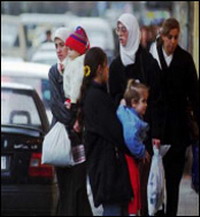French police track immigrants
A Russian boy got head injuries after falling from a window while trying to elude police. A North African man fractured his leg while fleeing officers. A Chinese woman lies in a coma after plunging from a window during a police check.

As France races to meet a target of deporting 25,000 illegal immigrants by the end of the year - a quota set by President Nicolas Sarkozy - tensions are mounting and the crackdown is taking a toll.
Critics say the hunt threatens values that underpin life in a nation that prides itself on being a cradle of human rights and a land of asylum. With three months left in the year, police have caught at least 11,800 immigrants, less than half the target, so Sarkozy has ordered his law-and-order team to pick up the pace.
"I want numbers," Sarkozy reportedly told Brice Hortefeux, the minister in charge of the crackdown. "This is a campaign commitment. The French expect (action) on this."
Hortefeux is head of the Orwellian-sounding Ministry of Immigration, Integration, National Identity and Co-Development, which Sarkozy set up after taking office in May. The president, who cultivated a tough-on-crime image while serving as Interior Minister, has made controlling immigration a major priority. He says France needs a new kind of immigrant - one who is "selected, not endured."
On Sept. 12, Hortefeux summoned prefects, representatives of the state, from 19 regions with low expulsion numbers for a "mobilization meeting."
Sarkozy's government is fast-tracking tighter immigration legislation. Parliament's lower house on Thursday approved a bill that would allow consular officers to request DNA samples from immigrants trying to join relatives in France. Even some Cabinet ministers dislike the measure, which critics say betrays France's humanitarian values.
The DNA tests would be voluntary and proponents say such testing, which would get a trial run until 2010, would speed visa processing and give immigrants a way to bolster their residency applications.
Sarkozy said Thursday that France should not stop at this new bill. He proposed immigration quotas by regions of the world and by occupation.
"I want us to be able to establish each year, after a debate in parliament, a quota with a ceiling for the number of foreigners we accept on our territory," he said.
The admission of Romania and Bulgaria to the European Union in January poses an unexpected problem because the two countries' citizens - who represented a huge chunk of illegal immigrants in France - can no longer be arrested for being in France.
There are no solid estimates of the number of illegal immigrants in France. The Immigration Ministry puts it at 200,000 to 400,000, many from former colonies in Africa. European countries to the south, like Italy or Spain, face a greater challenge from illegal immigrants than France - but neither have set themselves targets for expelling them.
In the Netherlands, the first act of the new parliament elected in November 2006 was to halt deportations set in motion by the previous government. Prime Minister Jan Peter Balkenende's new government declared an amnesty for up to 30,000 people. New asylum seekers and illegal immigrants still face a tough regime, kept in camps while their cases are handled. Even legal immigrants must pass language tests before coming and take citizenship classes in order to remain.
Russia has not fixed expulsion quotas, but has deported 56,000 illegal immigrants so far in 2007, the ITAR-Tass news agency reported this week.
Sarkozy wants to remodel France's immigrant community. The immigration bill, expected to get full parliamentary approval in early October, is meant to ensure that immigrants joining family members here speak French and grasp French values - to be proven with tests.
Resistance to the crackdown has built among human rights organizations, politicians of the opposition left, and even police.
Protesters, tipped off by the Education Without Frontiers Network which vehemently opposes the expulsion policy, have gathered by the dozens in Paris to protect illegal immigrants as police move in.
The three injuries of foreigners over the past two months have also mobilized critics.
The 12-year-old Russian boy, who was fleeing with his illegal immigrant father in the northern town of Amiens, has been hospitalized with serious head injuries since early August. The North African man in the southern town of Roussillon suffered double fractures to his leg. The Chinese woman fell from an apartment in Paris on Thursday when police investigating a theft complaint turned up to carry out a check.
"Neighborhood groups are forming," said Pierre Willem of the UNSA police union. "Reactions are becoming more and more violent."
But the search goes on, with the Metro a prime hunting ground. Some police officers worry they will get caught in the numbers hunt - accused of racism for making arrests on the basis of skin color or other illegal criteria.
Even unions representing Air France employees are protesting, saying the flagship carrier's image is suffering because the government uses it to return illegal immigrants, sometimes bound hand and foot, on flights occasionally marked by violent incidents.
"It's not our mission to be police auxiliaries," said Leon Cremieux, a national secretary of Sud Aerien. Conditions during some expulsions are "contrary to human rights."
Socialist lawmaker Michele Delaunay, of Bordeaux, last week became a symbolic sponsor of a Kurd of Turkish nationality who had been ordered to leave France, stalling the expulsion process.
"It's a way to show the public that these problems of expulsion are, above all, human problems and not numbers," Delaunay said in an interview, adding that the young man speaks French, worked and paid taxes, making his case "particularly legitimate."
Subscribe to Pravda.Ru Telegram channel, Facebook, RSS!




